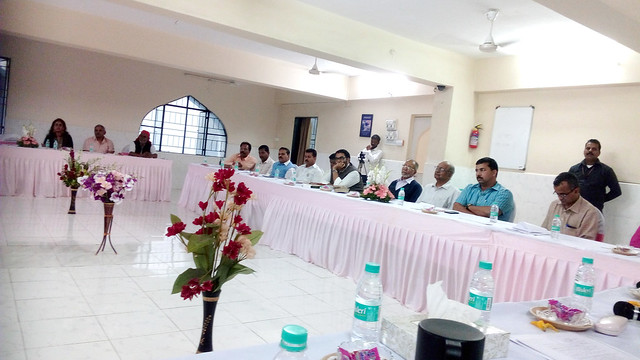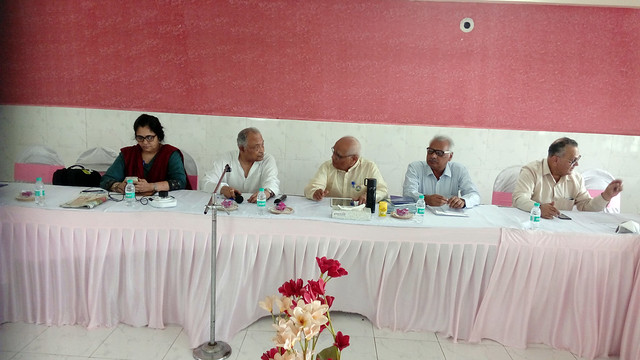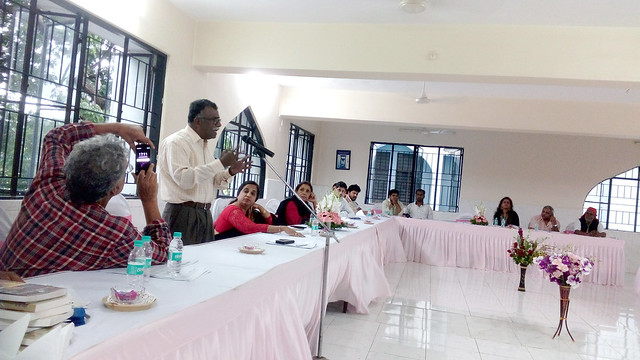By TCN News,
Pune: In order to counter the growing hatred and violence in the country, a group of restless, responsible like-minded intellectuals and activists have come together and planned out a mechanism for a joint action to face the challenging situations of the country by forming Desh Bachao Front (All India Secular Socialist Democratic Front).

Brigadier Sudhir Sawant, Mushtaq Ahmed Shaikh and others
The group passed a resolution during its two days meeting organized in Pune on September 24 and 25, 2016. The meeting was held under the chairmanship of Retired Justice P.B Sawant. The meeting was attended by prominent personalities who called upon likeminded people and organizations to forge a strategy of united actions to fight out fascist forces and to protect the cherished values of humaneness and constitution.
Following dignitaries participated in the Pune meet:
Justice P B Sawant, Former Judge Supreme Court
Justice BG Kolse Patil, Former Judge Bombay HC
R.B Sreekumar, Former DGP Gujarat
Vikas Narain Rai, Former DGP Haryana
SM Mushrif, Former IGP Maha
Amitabh Kundu, Former VC, J&K Univ
Shams ul Islam, Writer, Activist
Dr. Neelima Sharma, Theatre Artist
Teesta Setalvad, Activist
PA Inamdar, Educationist
Zaheeruddin Ali Khan, Editor Siasat Daily
Dr. Iftiqar Gilani, Journalist
Adv. Sharfuddin Ahmad, Political Activist
Birg. Sudhir Sawant, Activist
Mushtaq Ahmed Shaikh, Activist
Pratima Shinde, Activist
Manisha Rote, Activist
Dr. Jabbar Patel, Activist and several other prominent activists.
Following is the detailed resolution agreed upon by the group during the Pune meet:
Meeting headed by Justice PB Sawant
The last twenty-five years (several decades) or so have seen the governance of the country in the direction opposite to the constitutionally mandated goal. The present BJP regimes at the Centre and some states, are openly hostile to the Constitutional goal and have been openly trampling it and most of the precious provisions of the Constitution including the fundamental rights of all citizens. The fact that it is the ideological vision of the Rashtriya Swayamsevak Sangh (RSS) that dominates and drives this government, and the fact that this is unashamedly committed to a theocratic state (Hindu Rashtra), not the secular, democratic right laid down in the Constitution makes the present challenges even more complex, and acute. India’s social fabric is threatened everyday by inciteful speech and provocative politics that seeks to pit one Indian against another.

From Left – Teesta Setalvad, Justice PB Sawant, Justice BG Kolse Patil, Adv Sharfuddin SDPI Vice President, PA Inamdar
Exclusive and rabid nationalism that defies the inclusive nationalism mandated within secular, democratic republic is sought to be thrust down the throats of Indians. Falsely raised slogans like ‘love jihad’, ‘gharwapsi’ and ‘cow protection’ have been raised to fuel mob hysteria against sections of Indians, marginalizaed, Dalits, Women and Religious Minorities. This has resulted in an assault on the right to life, freedom and equality before the law and caused an atmosphere of deep fear and insecurity. Attempts to introduce discriminatory citizenship through amendments to the Indian Citizenship Act have also been attempted by this regime.
Indian university and campuses have become the seat for the present government’s all out efforts to crush dissent, essential to any democracy. Sections of the Indian law, like sedition have been used mercilessly to crush dissent.
The sovereignty of the country is being sacrificed by insidious commercial and defense treaties with foreign countries, while the latter threaten India’s independence, the former seek to snatch away precious people’s resources – forests, land, minerals and water – without following due process of law and ignoring the fundamental rights of Indians. The transfer of public resources to education and health sectors is evidence, if any were needed of India’s shift from a welfare state to an oligarchy of the rich. In fact, budgetary allocations and analysis (2013-2014) show, shockingly that as much as Rs. 5,00,000 subsidy has been grant to the Indian corporate sector when no such comparative subsidies have been provided for the agricultural sector, furthering employment among the marginalized, etc. etc.
Divisiveness within all sections of the society, even oppressed and marginalized sections, an absence of rationally and deep-rooted patriarchy that is enfeebling women and girls are malaises that affect the way democratic politics is playing out. Real democracy means empowering the democratic sections within all sections of society, especially girls and women, within all Indians, be they from a specific, simple and already recommended measures by the state and wider community but which are not being implemented. Child survivors and Child Witnesses need special measures that need to be implemented. Overall, an overall responsiveness within the criminal justice system needs to be ensured by ensuring a more representative and humane law enforcement that is educated on the Constitutional vision.

RB Sreekumar Former DGP Gujarat addressing
Agricultural distress, starvation and suicides of our farmers coupled with the unemployment of youth in urban areas on a vast scale call for an urgent and comprehensive political intervention that focuses on the issues discussed at the two day meet.
AGRICULTURE
Agrarian Distress needs to be addressed: Economics of Agriculture that pre-supposes the rights of the farmer, the non-availability of economic means/finance, absence of Minimum Support Price(s), Multi-Cropping of Agriculture, Deepening and Widening of Irrigation Cover, Fair Distribution Programme. For example, in Maharashtra alone, 52 percent of farmers have landholdings below 1 hectare leading to the non-negotiable conclusion that cooperative farming is the only viable option that must be encouraged by Governments and the State.
EDUCATION
The State’s responsibility for education and health of all citizens is mandated by the Constitution and the directive principles. This is being undermined by the privatization and commercialization of both sectors. Free and compulsory education from “KG to PG” is a slogan that we must adopt to ensure that the present system that deepens inequality while de-privileging 70 percent of Indians is reserved.
THREAT TO INDIAN CONSTITUTION DEMOCRACY AND PLURALISM
India is today threatened by an ideology that threatens the inherent plurality and multiplicity of Indian reality and it is this hegemony that is sought to be imposed through the New Education Policy (NEP), through textbooks and institutions of historical and social sciences research and learning. This undemocratic process needs to be halted and institutions of Indian democracy, be it education research and learning or governance (police, administration, bureaucracy, military and judiciary) need to, at all-time reflect the diversity that is India. The furthering of the Constitutional Vision, Preamble, Fundamental Rights and Directive Principles should be key to a campaign for public education and preserving the values enshrined within.
MAJORITARIANISM THRUST
Access to education and its content is a life line for the vast majority of Indians, to empower their life conditions and determine wise and sagacious choices. For the system of education to fulfill the role education is meant to, all concerned sections from the vast majority of the wide and disparate Indian population must have a say and stake in its content and orientation. This regime has come to power with a 31 percent of the vote garnered from 50 percent of the voting population and hence – though in power with a brute majority – does not in any way represent or reflect the voice of the Indian population.
The politicization of the bureaucracy and law enforcement agencies by forces that are promoting hegemony and majoritarianism needs to be halted and corrected.
INDUSTRY
Industry and industrial production is key and important to India but this process must also ensure economic participation at various levels and not concentrate wealth and power in the hands of few. The cooperative system of ownership and participation needs to be the model and focus of industrial advancement and growth. Employment patterns are also key to the choices we make, and job orientated growth needs to be the prime focus.
The Right to Work of all Indians needs to be a firm focus and part of this programme. Sustainable growth that ensures redistribution of resources, equal and faire participation while also generating employment needs us all Indians, and the political class, in particular to make choices that prevent an irreparable damage to the environment, to air, to water, to soil and forests and thereby to protect future generations from destruction of natural resources, from destruction and pollution and to prevent the spread of irremediable diseases.
WELFARE PROVISIONS TO BE PROTECTED
Social Welfare legislation that, throughacts of affirmative action seek to ensure that rural employment (MNREGA, 2005), transparency Right to Information (2005), rights of Adivasis and Forest Dwellers of Land (Forest Rights Act, 2006), universal access to food against starvation and hunger (Food Security Act 2013) are enhanced and protected. The present regime, at the Centre and in some states seeks to dilute these measures which in effect will disempower millions and further enhance the acute disparity between the haves and have-nots. The example of the Land Acquisition Act 2013 is pertinent. Within months of coming to power, the central government sought to bring in an ordinance that reduces accountability of the state in land acquisition: disempowering the gram sabha, removing the process of social audit and reducing statutory rights to compensation. When it failed to do so nationally, three governments at the state level, Maharashtra, Gujarat and Rajasthan have passed land laws without due diligence and process that in effect nullify the 2013 National Law.
The need of the hour is a wise, selfless collective leadership that brings together Indians and organizations to address these issues, further these objectives with a common minimum programme.
This Resolution is meant to serve as a Direction to Workers and Units to work on these lines.
